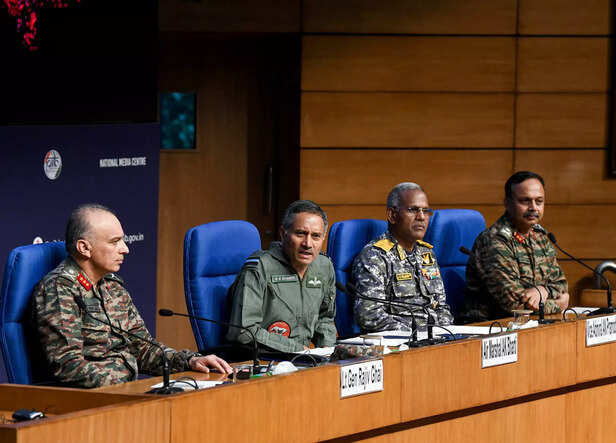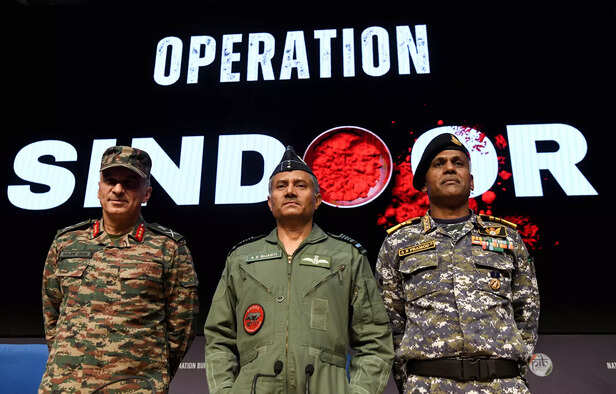India’s Top General Admits Aerial 'Losses' in Recent Conflict With Pakistan
Ushnish Samadder | ANI | Jun 05, 2025, 10:40 IST
( Image credit : ANI, Timeslife )
In a significant and unusually frank disclosure, a top-ranking Indian military official has publicly acknowledged that India sustained aerial "losses" during a recent armed confrontation with Pakistan. The admission has drawn national and international attention, as it breaks from New Delhi’s traditionally guarded approach to reporting military setbacks, especially those involving its volatile relationship with Islamabad.
During a press conference held in New Delhi earlier this week, the senior official—believed to be a high-ranking officer in the Indian Air Force (IAF)—confirmed that Indian aerial assets suffered losses during the confrontation. “There were indeed operational losses in the air during our recent conflict with Pakistan,” the general said. “These are unfortunate realities of modern warfare, and while regrettable, our response remained measured, strategic, and in line with national defense objectives.”
Though the official did not specify the number of aircraft lost or the full extent of the damage, the admission is being seen as a notable moment of transparency from the Indian military establishment. This statement aligns with satellite imagery and third-party defense reports that have been circulating over recent weeks, indicating elevated aerial activity and possible airspace breaches near the Line of Control (LoC), the de facto border between India and Pakistan in the disputed Kashmir region.

The conflict reportedly began with escalating tensions along the LoC, where frequent cross-border shelling has long been a feature of Indo-Pakistani hostilities. However, the most recent exchange escalated into an aerial confrontation, reportedly involving Indian Su-30 MKIs and Pakistani JF-17s. While Pakistan claimed to have downed Indian aircraft in retaliation for an alleged airspace violation, India had initially denied any significant losses.
This latest acknowledgment not only lends credence to Pakistan’s claims but also raises broader concerns about the fragility of peace in the region. With both nations maintaining sizable air forces and possessing nuclear weapons, even a limited aerial skirmish carries the potential to escalate into a much wider conflict.

Military analysts have responded to the development by calling for increased transparency, de-escalation measures, and diplomatic dialogue. “Such admissions, while rare, can pave the way for more realistic military planning and conflict management between the two countries,” said a retired Indian defense analyst.
The Indian public and political circles are also reacting to the news. While some critics have called for greater accountability, others have praised the military for its candor. In a region marked by decades of mistrust, this acknowledgment could represent a small but meaningful step toward fostering clarity and reducing the fog of war that often clouds India-Pakistan relations.
Explore the latest trends and tips in Health & Fitness, Travel, Life Hacks, Fashion & Beauty, and Relationships at Times Life!
Though the official did not specify the number of aircraft lost or the full extent of the damage, the admission is being seen as a notable moment of transparency from the Indian military establishment. This statement aligns with satellite imagery and third-party defense reports that have been circulating over recent weeks, indicating elevated aerial activity and possible airspace breaches near the Line of Control (LoC), the de facto border between India and Pakistan in the disputed Kashmir region.

DGMO Lieutenant General Rajiv Ghai, Air Marshal
( Image credit : ANI )
The conflict reportedly began with escalating tensions along the LoC, where frequent cross-border shelling has long been a feature of Indo-Pakistani hostilities. However, the most recent exchange escalated into an aerial confrontation, reportedly involving Indian Su-30 MKIs and Pakistani JF-17s. While Pakistan claimed to have downed Indian aircraft in retaliation for an alleged airspace violation, India had initially denied any significant losses.
This latest acknowledgment not only lends credence to Pakistan’s claims but also raises broader concerns about the fragility of peace in the region. With both nations maintaining sizable air forces and possessing nuclear weapons, even a limited aerial skirmish carries the potential to escalate into a much wider conflict.

DGMO Lieutenant General Rajiv Ghai, Air Marshal AK Bharti and Vice Admiral AN Pramod during the press conference on 'Operation Sindoor'
( Image credit : ANI )
Military analysts have responded to the development by calling for increased transparency, de-escalation measures, and diplomatic dialogue. “Such admissions, while rare, can pave the way for more realistic military planning and conflict management between the two countries,” said a retired Indian defense analyst.
The Indian public and political circles are also reacting to the news. While some critics have called for greater accountability, others have praised the military for its candor. In a region marked by decades of mistrust, this acknowledgment could represent a small but meaningful step toward fostering clarity and reducing the fog of war that often clouds India-Pakistan relations.
Explore the latest trends and tips in Health & Fitness, Travel, Life Hacks, Fashion & Beauty, and Relationships at Times Life!
